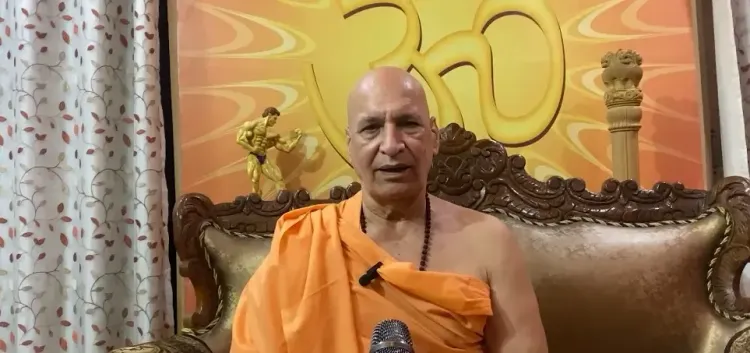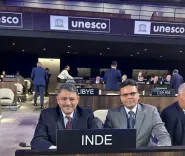How is Yoga Guru Supporting PM Modi’s Diwali Message about Health and Cleanliness?

Synopsis
Key Takeaways
- PM Modi’s Diwali message emphasizes health and cleanliness.
- Yoga is a holistic solution for physical and mental well-being.
- Reducing oil consumption can enhance health and fitness.
- Cleanliness is a yogic principle that promotes good health.
- Yoga can help reform individuals caught in negative ideologies.
Saharanpur (UP), Oct 22 (NationPress) Esteemed Padma Shri laureate and Yoga Guru Bharat Bhushan on Wednesday expressed his admiration for Prime Minister Narendra Modi’s Diwali message to the country, which highlighted the significance of health, cleanliness, and a balanced lifestyle.
Bhushan commended the Prime Minister’s initiative to reduce oil consumption, promote Yoga, and elevate health to a national priority.
In his Diwali correspondence, PM Modi urged citizens to prioritize their health, decrease oil intake in their diets by 10 percent, and incorporate Yoga into their everyday routines. His message served as a timely reminder to adopt mindful practices during the festive period.
Responding to this, Bharat Bhushan remarked to IANS, “The Prime Minister is a dedicated practitioner of Yoga himself. It’s natural that his approaches to national challenges resonate with yogic principles. Yoga offers a comprehensive solution—not only for physical well-being but also for mental tranquility, emotional stability, and spiritual discipline.
He further conveyed, “Yoga instills essential principles such as non-violence, truthfulness, celibacy, non-attachment, and discipline from the outset. These are not mere philosophical concepts; they serve as practical tools for everyday life. Whether addressing a physical ailment or a psychological challenge, Yoga provides a systematic path to healing.”
Bhushan emphasized that PM Modi's guidance is beneficial for all societal segments, including those grappling with social unrest or ideological extremism.
“Even youth engaged in Naxalism can discover peace and purpose through Yoga. It connects individuals to a higher consciousness and liberates them from negativity,” he asserted.
In response to the Prime Minister’s call for reduced oil consumption, Bhushan noted the growing health risks linked to unhealthy eating habits.
“Our contemporary lifestyle is characterized by excessive comfort and reduced physical activity, leading to obesity, heart issues, and mental stress. These problems are directly tied to poor dietary habits and insufficient movement,” he stated to IANS.
Clarifying PM Modi’s message, he explained, “The PM is not singling out any particular oil, be it mustard or sesame. His message emphasizes a decrease in overall fat intake. This can enhance our bodily efficiency, improve fitness, and lessen the strain on our internal organs. Ultimately, it’s about fostering awareness and making informed choices.”
He added that PM Modi has consistently addressed health-related topics since assuming office.
“He might be the first leader to continually champion health and wellness as a national priority. Citizens view him not only as a political figure but also as someone who grasps their daily challenges, from sanitation workers to scientists involved in Chandrayaan. His empathy transcends all societal levels,” he observed.
Bhushan stressed that Yoga extends beyond the mat—it represents a lifestyle.
“Yoga is not merely a practice; it’s a way of living. The journey starts with external cleanliness, but its ultimate aim is internal purity. One may don clean clothes yet harbor negative thoughts. True cleanliness encompasses a clear mind, heart, and soul,” he elaborated to IANS.
Discussing the significance of hygiene and cleanliness in the Prime Minister’s message, he asserted, “Cleanliness forms the bedrock of good health. This initiative is not just a public health campaign; it’s a yogic tenet. PM Modi exemplifies this by picking up a broom and engaging with the community, demonstrating that no task is too menial for anyone. As he progresses, the nation progresses.”
He also drew parallels with spiritual teachings.
“Children are instructed to wash their hands before prayers, brush after meals, and maintain cleanliness in their environment. These are not simply guidelines; they are instruments for fostering mindful behavior. Positive thoughts reflect on our demeanor, while negative sentiments such as anger and jealousy can shape our character,” he noted.
Reflecting on India’s response to the COVID-19 pandemic, Bhushan underscored how cleanliness and awareness were paramount in saving lives.
“India emerged as a leader during the COVID-19 crisis by distributing vaccines and medicines globally. This was achievable because our leadership promoted discipline—maintaining distance, avoiding physical contact, and emphasizing hygiene. These are core yogic values brought to life,” he stated.
He emphasized that these principles must transition from thought to practice.
“An idea holds no power while it remains theoretical. Once it manifests in action, it transforms into behavior. That’s the essence of Yoga—living it,” he concluded.
Bhushan discussed how Yoga and cognitive transformation can uplift even those who have lost their way.
“Individuals entangled in criminal behavior or anti-social ideologies can also be reformed through Yoga. If we assist them in modifying their thoughts to achieve mental clarity, they can become positive contributors to society,” he told IANS.
He added, “Even those involved in violent movements or trapped in negativity can change if their mindset shifts. Society evolves when individuals evolve. Change initiates within the mind.”









